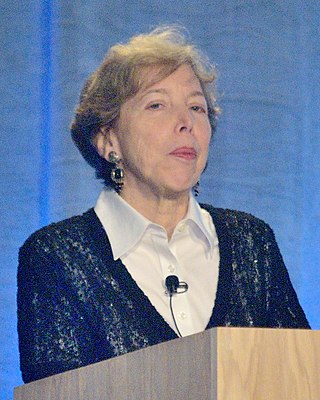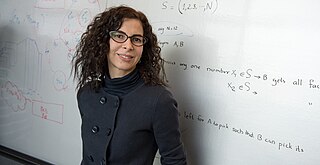Related Research Articles

Professor Sartaj Kumar Sahni is a computer scientist based in the United States, and is one of the pioneers in the field of data structures. He is a distinguished professor in the Department of Computer and Information Science and Engineering at the University of Florida.

Barbara Liskov is an American computer scientist who has made pioneering contributions to programming languages and distributed computing. Her notable work includes the introduction of abstract data types and the accompanying principle of data abstraction, along with the Liskov substitution principle, which applies these ideas to object-oriented programming, subtyping, and inheritance. Her work was recognized with the 2008 Turing Award, the highest distinction in computer science.

David A. Bader is a Distinguished Professor and Director of the Institute for Data Science at the New Jersey Institute of Technology. Previously, he served as the Chair of the Georgia Institute of Technology School of Computational Science & Engineering, where he was also a founding professor, and the executive director of High-Performance Computing at the Georgia Tech College of Computing. In 2007, he was named the first director of the Sony Toshiba IBM Center of Competence for the Cell Processor at Georgia Tech.

Susan Lois Graham is an American computer scientist. Graham is the Pehong Chen Distinguished Professor Emerita in the Computer Science Division of the Department of Electrical Engineering and Computer Sciences at the University of California, Berkeley.
Maurice Peter Herlihy is an American computer scientist active in the field of multiprocessor synchronization. Herlihy has contributed to areas including theoretical foundations of wait-free synchronization, linearizable data structures, applications of combinatorial topology to distributed computing, as well as hardware and software transactional memory. He is the An Wang Professor of Computer Science at Brown University, where he has been a member of the faculty since 1994.
Roberto Tamassia is an American Italian computer scientist, the Plastech Professor of Computer Science at Brown University, and served as the chair of the Brown Computer Science department from 2007 to 2014. His research specialty is in the design and analysis of algorithms for graph drawing, computational geometry, and computer security; he is also the author of several textbooks.
Fred Barry Schneider is an American computer scientist, based at Cornell University, where he is the Samuel B. Eckert Professor of Computer Science. He has published in numerous areas including science policy, cybersecurity, and distributed systems. His research is in the area of concurrent and distributed systems for high-integrity and mission-critical applications.
Ming C. Lin is an American computer scientist and a Barry Mersky and Capital One Endowed Professor at the University of Maryland, College Park, where she is also the former chair of the Department of Computer Science. Prior to moving to Maryland in 2018, Lin was the John R. & Louise S. Parker Distinguished Professor of Computer Science at the University of North Carolina at Chapel Hill.
Michael T. Goodrich is a mathematician and computer scientist. He is a distinguished professor of computer science and the former chair of the department of computer science in the Donald Bren School of Information and Computer Sciences at the University of California, Irvine.
Jayant R. Haritsa is an Indian computer scientist and professor. He is on the faculty of the CDS and CSA departments at Indian Institute of Science, Bangalore, India. He works on the design and analysis of Database Systems. In 2009 he won the Shanti Swarup Bhatnagar Prize sponsored by CSIR, India. In 2014 he won the Infosys Prize for Engineering.

Jitendra Malik is an Indian-American academic who is the Arthur J. Chick Professor of Electrical Engineering and Computer Sciences at the University of California, Berkeley. He is known for his research in computer vision.
Arnold Leonard Rosenberg is an American computer scientist. He is a distinguished university professor emeritus at the University of Massachusetts Amherst, and despite his retirement from UMass he continues to hold research positions at Northeastern University and Colorado State University.

James Weldon Demmel Jr. is an American mathematician and computer scientist, the Dr. Richard Carl Dehmel Distinguished Professor of Mathematics and Computer Science at the University of California, Berkeley.
Lydia E. Kavraki is a Greek-American computer scientist, the Noah Harding Professor of Computer Science, a professor of bioengineering, electrical and computer engineering, and mechanical engineering at Rice University. She is also the director of the Ken Kennedy Institute at Rice University. She is known for her work on robotics/AI and bioinformatics/computational biology and in particular for the probabilistic roadmap method for robot motion planning and biomolecular configuration analysis.
John Patrick Hayes is an Irish-American computer scientist and electrical engineer, the Claude E. Shannon Chair of Engineering Science at the University of Michigan. He supervised over 35 doctoral students, coauthored seven books and over 340 peer-reviewed publications. His Erdös number is 2.

Anna R. Karlin is an American computer scientist, the Microsoft Professor of Computer Science & Engineering at the University of Washington.
Subhash Suri is an Indian-American computer scientist, a professor at the University of California, Santa Barbara. He is known for his research in computational geometry, computer networks, and algorithmic game theory.

Farinaz Koushanfar is an Iranian-American computer scientist whose research concerns embedded systems, ad-hoc networks, and computer security. She is a professor and Henry Booker Faculty Scholar of Electrical and Computer Engineering at the University of California, San Diego.
Huan Liu is a Chinese-born computer scientist.
Aidong Zhang is a computer scientist whose research topics include machine learning and bioinformatics. She is William Wulf Faculty Fellow and Professor of Computer Science at the University of Virginia, where she also holds affiliations with the Department of Biomedical Engineering and School of Data Science.
References
- 1 2 Faculty profile, Brown University Computer Science Dept., retrieved 2012-03-02.
- ↑ John Edmund Savage at the Mathematics Genealogy Project.
- ↑ Available online under a Creative Commons license as of 2008.
- ↑ "John Savage's Home Page". cs.brown.edu. Retrieved 2019-03-11.
- ↑ ACM Fellow award citation, retrieved 2012-03-02.
- ↑ IEEE Computer Society Fellows Archived 2012-02-19 at the Wayback Machine , retrieved 2012-03-02.
- ↑ List of AAAS fellows Archived 2014-01-15 at the Wayback Machine , retrieved 2012-03-02.
- ↑ John Savage Honored with Named Professorship, Brown University Computer Science Dept., May 28, 2011, retrieved 2012-03-02.